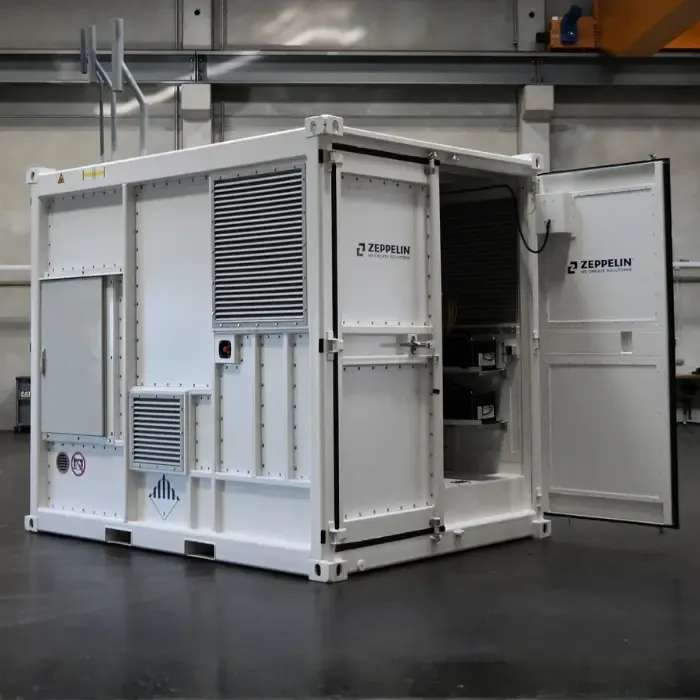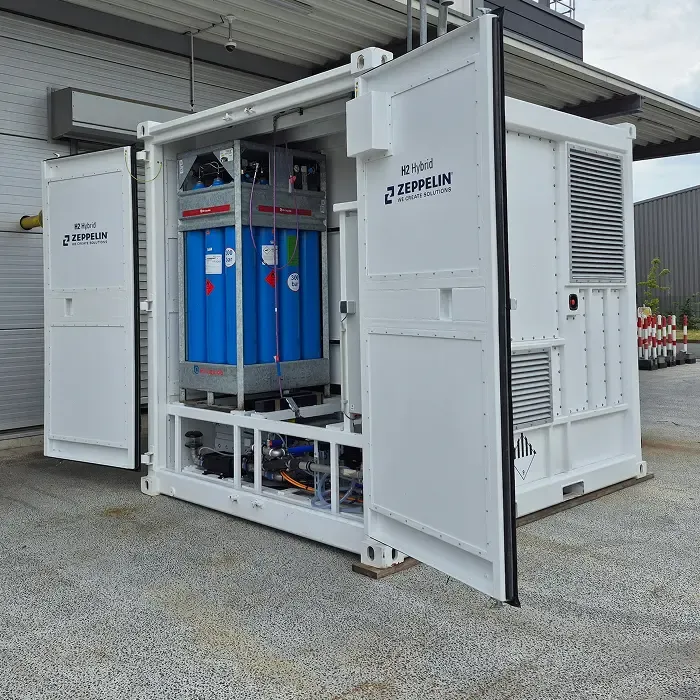Fuel Cell Technology – Efficient, Sustainable, Future-Proof
Tailored Fuel Cell Systems by Zeppelin Power Systems
Fuel cells are a key technology for zero-emission energy and propulsion solutions – across industries from construction and maritime to rail and energy supply. Zeppelin Power Systems develops manufacturer-independent systems tailored precisely to the requirements of your sector.
Whether as a mobile generator for zero-emission construction sites and events, a backup power solution for critical infrastructure, or a stationary unit for industrial applications – our systems reliably and sustainably replace conventional diesel generators. At the same time, we invest in research, development, and testing environments to continuously optimize fuel cell systems and prepare them for real-world use in diverse applications.
Zeppelin Power Systems supports you throughout the entire process – from energy system analysis and technical integration to operation and service. Together, we shape your entry into the hydrogen economy – reliably, efficiently, and CO₂-free.
Available for you 24/7
Germany
International
Zero-Emission Energy and Propulsion Solutions with Fuel Cell Technology
Key benefits for your organization
Cross-Industry Applications
From industry, construction, and energy to marine and rail – we develop customized fuel cell solutions tailored to a wide range of applications.
End-to-End Project Support
From energy system analysis and technical design to operation and service – we provide everything from a single source.
Manufacturer-Independent System Integration
We flexibly combine components into efficient overall systems – independent of manufacturers and precisely aligned with your requirements.
Proven Real-World Solutions & Pilot Projects
Our mobile hydrogen generators and stationary systems are successfully operating in real-world applications – from construction sites to industrial facilities.
Expertise for Sustainable Energy
We develop advanced testing environments, optimize operating strategies, and actively drive forward fuel cell technology.
Reliable Alternative to Diesel Generators
Our fuel cell systems operate emission-free, quietly, and efficiently – ideal for demanding applications with zero-emission requirements.

BSFZ Seal for Our Fuel Cell Development
Zeppelin Power Systems has been awarded the BSFZ Seal in recognition of its research and development activities in the field of fuel cell technology. The seal is granted exclusively to companies conducting in-house research and development in accordance with the German Research Allowance Act (FZulG) – a mark of our innovative strength and our commitment to a sustainable energy future.
Zeppelin Power Systems – Your Partner for Fuel Cell Technology
Are you exploring how fuel cell technology can be applied in your company, industry, or project? Let’s develop the right solution together—from pilot projects to full-scale deployment. Our experts are here to advise and support you.
Planning
- Consulting
- Concept Development
- Project Engineering
Engineering
- Electrical & Installation Planning
- Process Technology
- CAD-based Planning
Project Management
- Site Management
- Technical Procurement
- Quality Assurance
Plant Construction
- Electrical Installation
- Assembly
- Commissioning and Test Run
Service
- Maintenance
- Routine Servicing
- Troubleshooting Service
Fuel Cell Technology for Emission-Free Energy and Propulsion Systems
Fuel cell technology is a key enabler in the transformation of energy and propulsion systems toward a climate-neutral future. By converting hydrogen into electrical energy through an electrochemical process, fuel cell systems enable the operation of machinery, equipment, and vehicles without CO₂ emissions, particulate matter, or nitrogen oxides. At the same time, these systems offer high efficiency, modular scalability, and low noise emissions.
Fuel cells are increasingly being used as an alternative to conventional diesel generators and combustion engines in applications where emission-free, quiet, and highly reliable power supply is essential. Typical fields of application include construction, industry, maritime, rail, and decentralized energy supply.
Technology Overview – PEM Fuel Cell as Standard
The proton exchange membrane fuel cell (PEMFC) is the most commonly used technology in both mobile and stationary applications. It is characterized by the following features:
- Low operating temperature (60–80 °C) enabling fast start-up and high operational flexibility
- High power density, allowing compact system design
- Dynamic load response, ideal for fluctuating demand
- Modular design, scalable from a few kilowatts up to the megawatt range
The PEM fuel cell requires ultra-pure hydrogen (99.999%) as fuel and atmospheric oxygen for the electrochemical reaction. Besides electrical power, only water and small amounts of heat are generated as by-products.
System Integration – Components and Challenges
A functional fuel cell system includes not only the stack itself but also several balance-of-plant (BoP) components required for safe and efficient operation. These include:
- Hydrogen supply: pressure tanks, compressors, or pressure regulation systems
- Air supply: filtration and compressor systems adapted to environmental conditions
- Thermal management: cooling systems to dissipate process heat
- Humidity management: membrane humidification units to prevent degradation
- Power electronics: inverters, battery buffering, and load management for stable power output
- Safety architecture: monitoring for hydrogen leaks, pressure control, and fire protection
System integration is complex and highly application-specific. The requirements and configuration differ significantly between stationary systems and mobile units.
Research, Development, and Optimization of Fuel Cell Systems
A key driver of technological progress is the accumulation of expertise through research, testing environments, and pilot projects. The following areas are particularly in focus:
- Lifetime optimization: aging tests, degradation analysis, and development of operational strategies to extend stack life
- Efficiency enhancement: tuning of operating parameters and BoP components to improve overall system efficiency
- Cost reduction: development of series-production-ready components and standardized modules to lower capital and operating costs
- Filter technology: development of advanced air filtration systems to enable fuel cell operation in dusty, saline, or polluted environments
- Safety architecture: advancement of digital monitoring, diagnostics, and protection systems for hydrogen infrastructure
Zeppelin Power Systems Portfolio

